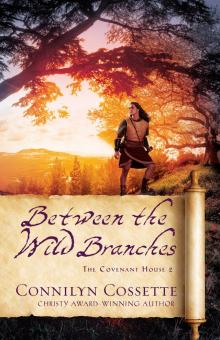- Home
- Connilyn Cossette
Between the Wild Branches Page 29
Between the Wild Branches Read online
Page 29
I took a deep breath, reluctantly looking past her to Eliora. My heart stuttered as I spoke directly to her. “In Ashdod. Where Lukio . . . Natan has been all these years.”
His sister, whom I now saw was in an advanced state of pregnancy, let out a cry. Wobbling, she was caught by her husband before she could sink to the ground.
How would I ever tell her that the hope I’d just given her was nothing more than a farce—and a cruel one at that? Lukio would be dead within the week, and there was nothing anyone could do to stop it.
“And you say he asked you to tell me of a game he taught you?” asked Elazar, whose hair and beard had become thoroughly gray while I’d been gone from the mountain. “What does this have to do with the Ark?”
With my children firmly planted on either side of me, Elazar, Eliora, Ronen, and I had been talking together atop the canopied roof of Elazar’s home about all that had happened in Ashdod, while the women prepared a meal and Eliora’s sister, Miri, tended to Galit’s injuries with the skill of a seasoned healer. Zevi remained down in the courtyard with Igo, watching some of the boys play with swords they’d fashioned from sticks. The longing on his face had been evident, and I hoped it would not take long before he, too, was joyfully engaged in mock battles with the boys of Kiryat-Yearim.
“I am certain he was giving me directions about what to do with the Ark. So, even if the worst came to pass, and the king of Ashdod somehow discovered it was here, it would be protected.”
“But what does this have to do with a game?” pressed the Levite, his silver brows furrowed.
“He told me he’d taught it to me in his special place. I thought perhaps he meant the sycamore tree, where we used to sneak out and meet as children, but then I realized he’d said his special place, which was a certain cave on the southwest slope.”
I’d already told Elazar of the secret friendship Lukio and I had had when we were younger, but I’d revealed nothing of our dreams to marry all those years ago.
Eliora gasped softly, her hand clutching Ronen’s. “I remember that cave. It’s where I found Yonah the day Natan ran off.”
“It was where he went whenever he was upset,” I said. “His refuge. He only took me there a few times over the years.”
“Did you know he was planning to leave?” asked Eliora, a note of uncharacteristic frustration in her voice. “That he was storing supplies in that cave?”
“No,” I said, looking directly into her eyes. “I would have told you if I had any suspicions. It would have broken my heart to think of him leaving this mountain.”
“I know,” she said, giving me a contrite look. “I did not mean to accuse you. I know how deeply you cared for him—and he for you.” I’d wondered if perhaps she’d sensed my love for her brother back then, especially after I’d come to fetch her during that last horrific fight between Lukio and Medad, when I thought they might kill each other.
“Was there something other than friendship between the two of you?” asked Elazar.
My face went warm. It was one thing to discuss it with Lukio’s sister, but his stoic father was a different matter.
“Our friendship transformed as we grew older, and Lukio . . . Natan said he was determined to marry me someday. It was innocent, I assure you, but though we were young we were very attached to each other.”
“And those affections have not changed?” Apparently, Elazar was determined to know all of it.
“Being in Ashdod stirred up those . . . memories. But as I said, he is . . .” I paused to take a breath. “He was betrothed to the daughter of the king.” I blinked against the tears prickling at my composure, and Eliora reached over to give my hand a reassuring squeeze.
“I see,” said Elazar. “So, tell me, why this game? Was it something you played together frequently?”
“No,” I replied. “He only showed me once.”
“And you know this is the game he meant for you to show me?”
I smiled. “I am. Once I show you, it will make perfect sense to you as well. However, I do need a few objects in order to do so.” I turned to my son. “Asher, can you quickly run down and search out four acorns from under the trees?”
“Of course, Ima!” he said, delighted to be of help, even if it would be the first time he’d let me out of his sight since my return.
“And, Aaliyah, can you go down and ask Yoela for six drinking cups?”
My daughter hesitated, plainly unsettled to go anywhere without me.
“I will be right here when you return.” I gave her a reassuring smile. She rose and did as I asked but checked over her shoulder twice before descending the stairs.
“Your little ones will be all right, Shoshana,” said Eliora, after Ronen and Elazar excused themselves to confer together on the other side of the roof until the children returned. “If there is anything I’ve learned by having children of my own, it is that they are resilient. Once they see you are here for good, their fears will eventually fade.”
I’d been told that my father and brothers had left Kiryat-Yearim soon after Medad took me to Beth Shemesh, which again left me without any family, so I found it more than comforting that Eliora assumed I would remain on the mountain. My children were obviously comfortable here, and I could not imagine ripping them away from a place that had offered them safety and stability when their mother had disappeared. Besides, I had nowhere else to go.
“How many children do you have?” I asked. “There are so many out there I don’t know who belongs to who.”
She laughed. “Yes, they are a small village unto themselves, aren’t they? We have four now. And this one, who should make an appearance before the latter rains begin.” She smoothed a hand over her rounded belly.
“And you remain at Ramah?”
“Yes, for now. Ronen has become a leader among the musicians there. Miri and her husband came with us, along with their three children. We returned for the celebration of Amina’s betrothal. She is to marry a young Levite in a year.”
“It is difficult to think of little Miri as a married woman.”
Eliora’s smile remained in place, but something in her eyes told me that Miri’s past had not been an easy one. “She came to help me while I was pregnant with our eldest son, Avidan, and met a Benjamite during that time.”
That surprised me. Most women married those of their own tribes, but it certainly wasn’t unheard of for tribes to intermingle, even with the Canaanites and other foreigners among us. However, it did surprise me that Elazar would allow it, since all of his other daughters were married to Levites, Eliora included.
“She has a son just a few months younger than our Avidan,” she said, which clarified the situation. Miri must have been already with child when the wedding occurred. “In fact, I would guess that your Zevi is similar in age to both Avidan and Gavriel. Perhaps the three of them will become friends. Although I think all the children are equal parts hesitant and enthralled with that giant beast watching over him.”
I laughed. “Fear not. That beast is as gentle as a lamb. But he is devoted to Zevi. The poor child is alone in the world, from what I understand. And I think he has suffered much. Lukio . . . I mean, Natan told him that he would find a home here on the mountain, and I mean to fulfill that vow.”
“I would expect nothing less. You are a wonderful mother,” she said, “and Zevi will be blessed to have you take him under your wing.” She paused to peer at me. “It’s all right if you call him Lukio, Shoshana. I still think of him that way as well sometimes. Perhaps it is more my hope that he would someday embrace life with the Hebrews that causes me to call him Natan.”
My cheeks flushed warm again. “It was a secret name, of sorts, between us. He was Lukio, and I was Tesi.”
“Small one,” she said, recognizing the Philistine word. “I can see why he called you that. I knew there was something between you back then, and he even admitted it to me when he discovered you were betrothed. I am not surprised that my brother still adores
you after all this time. He is nothing if not loyal, which is why he was so very devastated when he thought that the three of us had betrayed him. It is his greatest strength but also his greatest weakness, I think.”
“I am sorry that I don’t bring better news of him,” I said past the burn in my throat. “I would do anything if it meant he was here with us now.”
She looked into my eyes with open affection. “I have learned to hold not only him but everything in my life with an open hand, trusting that no matter what, Yahweh is good and that he is watching over my brother, even in Ashdod. Until we know for certain that he no longer breathes, I will pray for his return.”
Eliora had been a woman of grace and kindness when I left this mountain, but after years of living in the company of Samuel and those he was raising up to speak truth to the tribes of Israel, it was clear that she’d become a woman of great strength and faith as well. For someone born a Philistine, a child of our enemies, this was a miracle indeed.
“And even if I do not see him again in this life,” she continued, her deep green eyes shimmering with tears, “I am consoled by his honorable actions in these past months. He may have spent the last few years as a fighter, just as I feared, but he is not our birth father. From what you’ve said, he defended the helpless and risked himself to save lives, just as Azuvah prophesied he would the night she saved us. And for that I will praise the name of Adonai.”
Asher appeared at the top of the stairs, his face alight with glee before I could ask her more about what else their childhood maid had said about Lukio. “I found all four acorns, Ima!”
He dumped the treasures into my hand and sank down beside me, pressing close and grinning up at me with open adoration. Aaliyah, too, returned, carefully carrying a stack of six ceramic cups with slow and measured steps.
“Thank you, my loves,” I said giving them both a kiss once Aaliyah settled back into her place at my side. Just the act of being able to kiss my children after all these months filled my heart with overflowing gratitude. My entire body seemed replete with joy.
The men returned to sit with us, Ronen tugging his wife closer to place his own kiss on her cheek and give a gentle brush of his palm over her middle. His adoration of Eliora and his unborn child caused a small pang of envy in my heart.
“Does anyone have a knife?” I asked, pushing away the longing for something that would never be. Ronen handed me a small bronze one from his belt that he probably used for instrument building. It was far too delicate to be a weapon.
I pried the top off one of the four acorns as everyone watched me with rapt attention. Then I placed each one beneath a cup and shuffled them—along with the two empty cups—around on the ground in an exaggerated manner. I could not keep the image of Lukio doing this very same thing on the floor of the cave from rising up, but I blinked it away, I was already at the very limits of my control; it would not do for me to burst into tears in front of everyone. Once I was certain that the players of my game were sufficiently disoriented, I slid one cup in front of each of us.
“There now,” I said, “Asher, where is the acorn without a top?”
He pointed to Eliora’s cup, and when I told her to lift it, there was no acorn at all. He frowned deeply.
“Aaliyah? Where do you think it might be?”
She hesitantly pointed to her own cup, but the acorn beneath it was intact.
One by one each cup was lifted, but none of them held the acorn with the missing top.
“Where did it go?” demanded Asher, bewildered and irritated that none of his guesses had been correct.
But Ronen was already grinning, having divined my trick.
“Ima! Show me!” said Asher.
But Aaliyah had guessed as well. She laid her small hand atop mine, and her hazel eyes sparkled up at me. Grinning, I unfolded my palm to reveal the missing acorn and tapped her on the nose with it.
Asher’s jaw dropped. “How did you do that?”
But before I could answer, Elazar articulated Lukio’s message with a note of awe in his voice. “He proposes we have false vessels constructed and marched about the territory so people will think it’s been moved.”
I nodded, glad that he’d not only deciphered the meaning of the game but also that he seemed intrigued by Lukio’s idea. When I’d finally figured out the message within the message, I’d thought it was nothing short of brilliant.
“All it would take is a few priests carrying a linen-covered box on their shoulders,” I said. “Since unconsecrated Hebrews cannot approach the Ark, they’d never know the difference.”
“But in truth the Ark would remain here?”
“Yes. In the cave,” I said. “It’s plenty large enough, easily hidden by brush, and difficult to get to without knowledge of the mountain. Even if somehow the Philistines discovered Kiryat-Yearim to be the resting place of the Ark, they would be hard-pressed to find it. Especially if the tent it has been in for these past two decades remains standing, but empty.”
Ronen seemed delighted by the idea. “We could even have a few men go into the towns where Philistines trade and spread rumors that the Ark was moved months ago, whisper that it was taken down to the Mountain of Adonai, or all the way up to Har Hermon, or to the east side of the Jordan, or even . . . that it disappeared in a fiery cloud and was taken into the heavenly realms! That should confuse our enemies plenty.”
Elazar stroked his beard, his eyes on the cups and acorns. “They have been getting very close to us now that they control Tzorah and Beth Shemesh. And if they somehow break past Dan’s defenses in the Ayalon Valley and take control of the eastern trade route, they will have us surrounded on three sides.”
“It’s a good plan,” said Ronen. “Smart. Crafty. And it keeps the Ark where it should remain until the Philistine threat can be mitigated.”
“Do you think that will happen?” I asked.
“Samuel believes so. Under his leadership, the tribes have defended against a number of attempted raids. And we’ve been seeing the people of Yahweh returning to his ways in droves—whole clans coming together to burn their idols, reaffirm their commitment to the covenant, and circumcise their males, young and old. Many of the tribes now see Samuel for what he is: a shofet chosen by Yahweh to adjudicate the Torah and to reveal his Word to the people.”
“There are those who do not see him that way,” cautioned Elazar. “Many of the clans of Yehudah and Simeon still see him as a usurper. They’ve installed their own High Priest at Hebron and refuse to submit to Samuel’s authority.”
“My uncle and his friends escaped justice after their attempt to steal the Ark,” said Ronen. “Some of them fled south, vowing to lift up a descendent of Eleazar ben Aharon. And so they did.”
“They will certainly not be happy when they hear we’ve moved the Ark,” said Elazar.
“All the more reason to sow seeds of confusion,” said Ronen. “I hope my uncle will not make another attempt at stealing it, but, knowing him as I do, I am certain he’s not stopped plotting ways to get his greedy hands on it.”
“I will confer with my men and send a message to Samuel. We’ll need to do this carefully and correctly, and I do not want to do anything until I have his blessing.”
The door opened just then, and three broad-shouldered men strode inside. Gershom and Iyov looked much the same as they had when I left Kiryat-Yearim, but Gershom’s beard and hair were threaded with silver like his father’s once had been. Yonah, however, had become a man. At eighteen, he stood nearly as tall as his older brothers. The only thing that set him apart from the rest was his slightly uneven gait, due to the foot that had been twisted from birth. It was likely that the three of them had been summoned from down in the valley when we returned, since none of them looked surprised to see me.
“What plan?” said Gershom, the eldest.
“Your brother sent Shoshana with a scheme to hide the Ark,” replied his father. “It seems the king of Ashdod has a particular obsession with see
king it out.”
My heart clenched tight at hearing Elazar call Lukio their brother. Just as I’d assured him, even after all these years his family hadn’t turned their backs on him. If only he could see the distress and concern on their faces now. Their lack of surprise at their father’s announcement made it apparent they’d already been told where Lukio was and some of what had happened over the past ten years.
Iyov looked down at me. “Where is he?”
I frowned, wondering if I’d been mistaken about how informed they were.
“In Ashdod still,” I replied. “He bargained his life for mine.”
“No, I mean, where is he now? In a prison?”
“I don’t know. The only thing Jaru told me was that the king insisted he fight during the festival before leading the army to the Ark.”
“When?” asked Gershom.
“There are to be four matches in total, one each day of the festival. Today is the second day. Once he is finished fighting, they will undoubtedly kill him. But why does that matter?”
“Because,” said Yonah, his eyes narrowing, none of the small and uncertain boy he’d once been remaining in his iron-jawed expression, “we’re bringing him home.”
Thirty-One
Lukio
Teitu did not look well. The dim light from the high slits in the watchtower walls illuminated the swollen and bloodied mess that was his face and torso, and I wondered how he’d even survived this last beating. But at least he still had one eye.
I’d fought three times now, playing the part of Demon Eyes and winning each time. However, each time I returned to my prison, the one within the vineyard watchtower on my own land, where the Hebrew men had been held, Nicaro’s men had beaten Teitu in front of me—a reminder of what was to come if I did not continue my streak of wins.
I’d only seen Nicaro himself out on the fighting grounds, where I was forced to bow before him in a public show of loyalty before and after each match and give glory to the king who would kill me the moment he realized I’d lied to him about the whereabouts of the Ark.

 Until the Mountains Fall
Until the Mountains Fall Between the Wild Branches
Between the Wild Branches To Dwell among Cedars
To Dwell among Cedars Counted With the Stars
Counted With the Stars Shelter of the Most High
Shelter of the Most High Shadow of the Storm
Shadow of the Storm A Light on the Hill
A Light on the Hill Wings of the Wind
Wings of the Wind